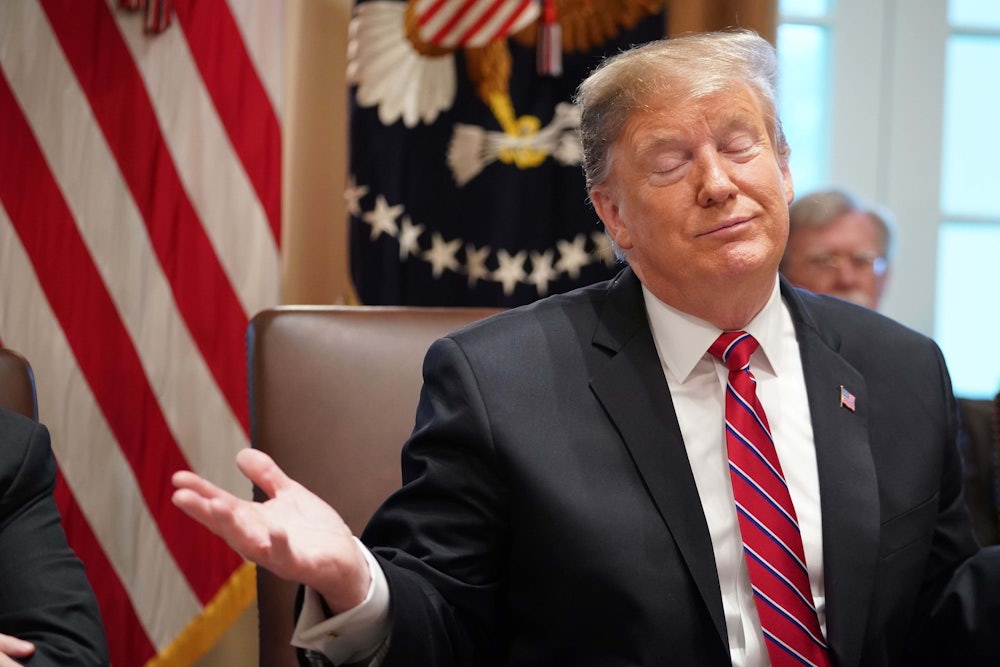It’s long been clear that President Donald Trump won’t get anything resembling the border wall that he promised his supporters on the campaign trail. The government-funding deal struck between Democratic and Republican lawmakers earlier this week only confirms it. Congress will set aside less than $1.4 billion for bollard fencing—a type of physical barrier that’s close enough to a wall to placate Trump, and far enough from a wall to satisfy Democrats. The deal, which must be signed into law at midnight on Friday to avoid another shutdown, is less about resolving any immigration issues and more about providing political cover for a wounded president—lest he lash out yet again, without regard for the collateral damage.
This is a fitting outcome for the Trump era. The three-month clash over border wall funding was always more about theatricality than substance, even though the 35-day government shutdown damaged the livelihoods of hundreds of thousands of Americans. The reported details of the deal only confirm what was obvious all along about this standoff: that it was a nihilistic political gambit by the president and his Republican allies.
There’s no way to spin the emerging deal as anything other than a defeat for them. In December, Trump scuttled a compromise struck by lawmakers that would have allocated $1.6 billion in funds for physical barriers along the southern border, and instead demanded $5.7 billion to construct the steel and concrete wall that he had promised voters he would build. This new deal, by contrast, reportedly provides only $1.375 billion for barriers along the southern border. No wonder Trump is so openly dissatisfied with the deal’s terms.
But he may have no choice other than to accept it. The shutdown threw more than 800,000 federal workers into immediate financial hardship and paralyzed key government functions. Cascading economic and political damage eventually forced Trump to approve a three-week resolution to reopen the government—a humiliating climbdown for the president on his signature issue. With GOP lawmakers now firmly opposed to any further shutdowns, the president lacks any real leverage to force Congress to act on the wall before the 2020 elections.
The bill’s final text had not been released by noon on Wednesday, but it appears more performative than legislative for Democrats, too. Negotiators had privately pushed for a hard cap on the number of people who can be detained by Immigration and Customs Enforcement. Trump and his congressional allies responded by framing the request as an attempt to release hardened criminals onto America’s streets. As Mother Jones’ Noah Lanard noted, most of the people detained by ICE were originally arrested for minor offenses like traffic stops. But the pushback appears to have worked, as no such hard cap appears to be in the final package. (Instead, it reportedly sets funding for detention beds at 17 percent below current levels, but allows ICE to draw additional detention funds from other agencies within the Department of Homeland Security.)
While a wall would undoubtedly stop some people from crossing the southern border, it also misunderstands how undocumented immigration works. Most of the nation’s undocumented immigrants came to the U.S. legally and then overstayed their visas; most evidence suggests that unauthorized border crossings have steadily plummeted since the Great Recession. Nor would a wall stem the flow of illegal drugs into the country, as Trump has repeatedly insisted it. Almost all of those drugs enter through the nation’s ports of entry, not the hinterlands that separate them.
The wall may thus sound like a solution in search of a problem, but that would be misunderstanding its purpose. The real problem is Trump’s political self-image. The wall’s main goal is to serve as a physical manifestation of the president’s reactionary white nationalism. He pushed the idea so aggressively on the campaign trail because it symbolizes his xenophobic worldview, functioning more as rallying cry for his like-minded supporters than as a practical redoubt for the nation.
This explains why Trump has switched to lying about the border wall’s status. News that a compromise had been struck first broke during Trump’s rally in El Paso, Texas, on Monday, and he passed this along to his assembled supporters. “Just so you know, we’re building the wall anyway,” he said to cheers. The White House has been floating the idea of declaring a national state of emergency to divert other government funds to make this a reality. Such a move would almost certainly end up in the courts, where the administration has a grim track record. What matters to Trump is not necessarily that he wins, just that he’s not seen as losing.
All of this kabuki theater would be more bearable if it had no real-world impact. For the federal workers who endured lost paychecks because of the president’s posturing, that’s not the case. The rest of the nation lost something, too. Time is a finite resource that the Trump administration is nonetheless eager to squander. Members of Congress have spent months trying to fashion something that would satisfy Trump’s voluble whims. All the energy and effort could have been spent on literally any other plausible legislative effort—infrastructure funding, further criminal-justice reform, the opioid crisis, or drug-price reform. Instead it went toward soothing the president’s bruised ego and burnishing his tattered self-image.
